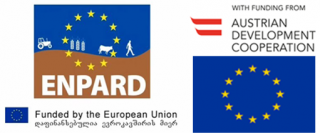Ancient Greeks’ fascination with Georgia was not limited to the Golden Fleece. Legend has it that ‘Georgia’ comes from the Greek γεωργός (Georgios), reflecting the advanced land plowing practices of Georgian tribes, which distinguished them from their nomadic and yet unsettled neighbors. The Georgians (Colchians and Iberians, to be more precise) must have really made a formidable impression on the Argonauts to deserve such a recognition.
Fast forward to the 21st century. According to the CIA World Factbook, Georgian agriculture employs a mind-blowingly high share of the country’s labor force (55.6%) with agricultural productivity remaining virtually stagnant over the past two decades. According to The World Bank data, Georgia’s agricultural value added per worker is one of the lowest among developing countries and is way behind that of our European neighbors.
There are numerous reasons for the low productivity of Georgian farmers. The usual suspects are: endemic infrastructure problems; outdated technology and equipment; lack of professional skills and knowledge; and severe liquidity constraints – a key cause of underinvestment in the sector.
While these challenges are well-documented, the root cause of the problem (and its potential cure) maybe elsewhere. This view comes from an authoritative source: Nino Zambakhidze, a well-known (agri) businesswoman, and head of the Georgian Farmer Association (GFA). What is really crucial for Nino is the fact that the vast majority of Georgia’s rural youth leave their villages and move to the cities.
“Most young people I meet on my trips in the countryside simply don’t see their future in agriculture”, says Nino. “They lack appropriate role models and have no idea how a successful farmer may look like. They don’t understand what benefits they might derive from agriculture, and have no incentives to invest in those skills and knowledge that would help them become successful farmers and agricultural business managers. Yet, if there is any hope for Georgia’s countryside it must be associated with those very youth. They are the ones who can breathe new life and bring the much needed efficiency to the agricultural sector.“
While heartbroken, Nino was determined to turn the tide. As a first step, she resolved to find successful young entrepreneurs who work in agriculture and have the leadership skills to ignite hope in the hearts of many more young Georgian farmers. And it did not take long until Nino had the-one-who-seeks-finds moment, when Baia Abuladze – a 22 year old winemaker who recently stormed the Georgian cyberspace – knocked on the doors of GFA. Says Nino: “I met Baia on the GFA premises. Her eyes bristled with enthusiasm as she was telling me her story. What immediately struck me was a great sense of humor and an irresistible drive.”
What followed was an incredible success story.
SHE CAME AND SHE CONQUERED
Baia was born and raised on her parent’s farm in Obcha village (Baghdati region in Imereti). As a typical agricultural family, the family owns cattle, domestic animals, and cornfields. However, Baia’s family owns the largest vineyard in the village, and winemaking has been its main business for years. While being an outstanding student at the local school, Baia did not hesitate to get her hands ‘dirty’. From early spring to late autumn she helped operate the family farm. ‘My father would not fit into a kvevri. I had to jump in and help him get it washed’ – quips Baia with a radiant smile.
The hard work and dedication produced what is highly valued in business and cannot be acquired at any school or university – experience! “Baia took my breath away with her knowledge of winemaking. She spoke about the subject with the precision and passion of an artist paying attention to every stroke of her brush while painting a masterpiece.”
Like many kids of her generation, Baia went to study in Tbilisi, majoring in political science at Tbilisi State University and continuing to a Master’s program in public administration at Ilia State University. But she never severed ties with the village and her family farm. Although the family owns an apartment in Tbilisi, the only place Baia calls Home is her ancestral Imeretian Oda in Obcha. She remembers longing for the summer holidays when she would be able to come home and give her family a helping hand.
Baia slowly came to realize that her family’s winemaking business had great potential for growth. Higher education and life in the capital helped her understand that in order to be successful in winemaking she had to create a brand and market bottled wine. She used her skills to secure a 5,000 GEL grant from the Micro- and Small – Sized Enterprise Promotion Program (MSSEPP). “The grant allowed us to buy everything we needed for bottling” – reflects Baia. Then came the process of label design in which Baia also played a vital role. After a while, Baia’s hard work and determination have finally paid off: Baia’s Wine was born! Having secured contracts with five stores and two restaurants in Tbilisi, Baia was already planning to distribute her wine in Batumi. “It was such a pleasure when they called and told me that my wine was selling well. An amazing feeling of accomplishment’ – notes Baia with pride.
However, Baia’s life was to change once again. It all started when Baia came across a Facebook post about GFA. Curious, she wrote to Nino and requested a meeting. Two days later, Nino helped Baia write a blog article telling her story. From that day on, this story was all over Georgian TV channels, online media, newspapers and magazines. “I received 1,500 Facebook friend request and 500 messages in just a few days’ – recalls Baia.
This was a defining moment. Baia fully appreciated the value of publicity that her acquaintance with Nino generated. As more and more people got to know about her family and village she felt proud for her accomplishments and finally came to understand that winemaking has always been the love of her life. “Without Nino’s support,” – says Baia, “I would have perhaps ended up becoming an academic. It is all different now. With so many people watching and supporting me, I feel responsible for upholding the name of my business, my family and village. This gives me a totally different motivation. I am 100% devoted to my business now.”
FINDING STRENGTH IN UNITY
Encouraged, Nino continued her quest and found many other like-minded young farmers. She recounts the story of each and every one of them as a proud and caring parent. She knows to tell about Gurami from Bodbe who practiced butchery since he was 14. “Gurami’s Meat” – a brand created by Gurami and his brother – enjoys great reputation all over Kakheti. And there are Melano, who grows mushrooms, and Nodar, who produces milk, cheese and other dairy delicacies in the Georgian highlands. There is Mindia from Samegrelo whose honey is beyond competition. And there is Giorgi from Samtskhe-Javakheti who owns vine terraces and produces traditional Meskhetian wine.
"They are all well-educated, have charisma and are good public speakers. They understand marketing 101 and have a passion for business. They know English and can go online to find anything they need for their business” – tells Nino with pride.
Nino was determined to make these young farmers known to a larger audience. “With publicity one can kill two birds with one stone” – says Nino. One the one hand, public recognition is a formidable incentive for these young guys to do their best and continue to improve their products. On the other, their example would be a signal to many others that going back to one’s village and operating a successful agribusiness can be really ‘cool’”.
Nino very well understands that this is just the beginning of a long journey. In order for these well motivated young professionals to have an impact on the lives of their fellow young citizens, she decided to bring them together and create an organization - the Young Farmers Association (YFA), to be led by Baia. The main objective of YFA will be to advocate for youth in agriculture, to identify motivated young farmers in need of help and guidance, and provide them with the professional advice they seek. “They speak the same language and it will be easy for them to relate to their young friends. Their voice will be heard”. – believes Nino.
YOUNG AND MOTIVATED
Baia and other YFA members are obviously the cream of the crop. And Baia, like Nino, does not underestimate the gravity of problems plaguing Georgia’s agricultural sector. However she remains hopeful. “Agriculture is a priority for the government and donors. I receive many messages from young farmers who need advice on possible sources of startup capital, how to write grant applications, where to look for appropriate trainings.” “All we want is nudge them in the same way in which I was nudged by the MSSEPP grant of 5,000 GEL and Nino’s help with publicity... We provide a little push and they will do the rest. They have sufficient ability and experience” – she proudly concludes.
* * *
Agricultural development is indeed a high priority item on the agenda of the Georgian government and international donors. Yet, so far, both government policies and millions of dollars (and Euro) spent by the international community in agricultural subsidies and grants have failed to bring about the needed change. Perhaps, they are betting on the wrong (old) horses?
 The article was first published in Georgia Today - Georgia's leading English language newspaper, published twice weekly.
The article was first published in Georgia Today - Georgia's leading English language newspaper, published twice weekly.



















Comments
interesting, thanks for sharing. I think the Internet makes it a bit easier for young people to stay out in the countryside, because they are less cut off than before. But there still is quite a way to go, and any role model helps.
I was positively surprised when Baia mentioned 'nudge' – referring to Richard Thaler and Cass Sunstein’s New York Times bestseller of the same name that advocates architecting people’s choices for the benefit of themselves and for the benefit of the society. Baia later explained that she understood the concept but did not have a chance to read the book in the original and dreamed to do so.
ISET decided to generously endow Baia with a hard copy of Nudge - a book she was so inspired by. It is ISET's firm belief that young and dedicated like Baia must receive all the support and recognition they deserve. We wish all the best to Baia and her colleagues in their business endeavors and believe that, they altogether, will make the world a better place.
Nice piece, thanks for sharing
that's an amazing story, about Nudge, and almost worth a blogpost in itself. You may be aware of http://www.radarami.org/, and Nudge would be a great book to translate into Georgian.
I shared this article on Facebook and together with a lot of praise got a request to stop spreading the unfounded theory that the name "Georgia" has anything to with the Greeks's appreciation for Georgia's agricultural skills. One plausible theory has it that it is the wolf skins (gurj, in Persian), and not superior agricultural skills that distinguished Kartveli tribes, after all...Thomas Wier's article on the etymology of Georgia and Sakartvlo can be found here https://www.quora.com/Why-do-the-US-state-of-Georgia-and-the-country-of-Georgia-have-the-same-name
I understand and I deliberately chose word 'Legend' not to have any claim on the historicity of the argument.
What is fact though is that the recent state of Georgia's agriculture is in peril and something has to be done about it irrespective of how glorious the past may or may not have been.
good news! I heard from the good people at Radarami that "Nudge" is about to be translated into Georgian. You'll probably hear more from them soon.